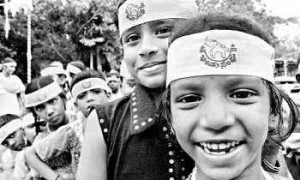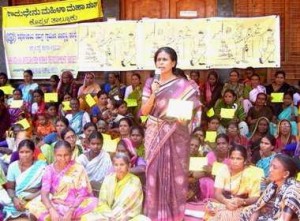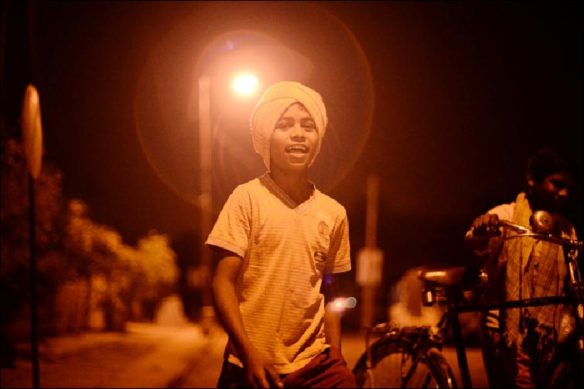History
1977: At a union meeting in the Peenya industrial estate in Bangalore, Karnataka, trade unionist Nandana Reddy notices a large number of children among the workers. Listening to their concerns, she realises that working children are in need of organisation and support and begins working with them to secure legal rights and protection under labour laws.
1978: India’s first central government report on child labour, the Gurupadaswamy report, is published. It was prompted by a question asked in Parliament by minister George Fernandes, suggested by Nandana.
1985: The Concerned for Working Children is formally registered as a society.
1986: India’s most recent law dedicated to child labour, the Child Labour (Regulation & Prohibition) Act, is passed. Having contributed extensively to the planning of the bill, CWC is dismayed when the final bill criminalises working children while removing much of the planned support to provide alternatives to work.
1986: CWC launches its urban field programme, with full-time field staff working to help and empower children employed in hotels, garages, construction sites and elsewhere around Bangalore. Night centres and extension schools are opened to provide working children with education, hot meals and the opportunity to bathe.
1989: CWC establishes its rural programme, sending field workers to Udupi district in Western Karnataka to help working children organise for their rights. Centres for children are opened in villages across the Taluk of Kundapur, an area where many migrant working children are from.
 1990: CWC facilitates the creation of Bhima Sangha, the union of working children. Bhima Sangha chapters in each village provide working children with an opportunity to discuss and share experiences and take collective action for better conditions. Within a few years its membership expands to 13,000.
1990: CWC facilitates the creation of Bhima Sangha, the union of working children. Bhima Sangha chapters in each village provide working children with an opportunity to discuss and share experiences and take collective action for better conditions. Within a few years its membership expands to 13,000.
1991: CWC launches Varahi Parichaya (named for the Varahi river in Karnataka) a landmark survey exercise by the children of Kundapur Taluk, Udupi district, exploring the links between economic decline and environmental degradation in rural communities. The following year, CWC launches its rural economic regeneration programme, Hale Beru Hosa Chiguru (“Old roots, new shoots”), which seeks to provide sustainable rural livelihoods by reviving traditional craft professions. Namma Angadi (‘our shop’) is launched as a collective marketing organisation for rural artisans.
1991: Four children die in a fire at the Hotel Suruchi in Bangalore, bring new attention to the issue of safety for child hotel workers. Members of Bhima Sangha set up an enquiry committee to review the accident and uncover multiple violations of workers’ rights by the management. They conduct a protest that forces the hotel to close down.
1992 – CWC is one of the founding members of the International Working Group on Child Labour.
1993 – CWC establishes Namma Bhoomi, our residential resource centre in Kundapur, Udupi, and begins providing vocational training to local working children. Ultimately this grows into Namma Nalanda Vidyapeetha, a full-fledged teaching programme educating over 100 students each year.
1994: CWC facilitates children in five Panchayats to conduct household surveys to identify issues in their communities and individuals in need of government assistance. CWC goes on to become a world leader in facilitating child-led research. Ten years later, child researchers trained by CWC are asked to offer research training by satellite video link to over 80,000 adult Panchayat members across Karnataka.
1995: CWC launches the Toofan Programme, a radical experiment in children’s representation in local government. In five Panchayats across Karnataka, Toofan establishes Makkala Panchayats (children’s councils) and task forces to carry children’s voices into government.
1995: CWC introduces the Appropriate Education Programme, our first large-scale education intervention. AEP aims to enhance children’s access to and experience of education by working with teachers and government to improve formal schools and establishment extension schools for working children.
1996: CWC helps host the first International Meeting of Working Children in Kundapur, Udupi. Delegates attend from 32 countries across Asia, Africa and Latin America.
1997: Former members of Bhima Sangha establish Namma Sabha, an organisation for former child workers who have reached adulthood.
1998: Facilitated by CWC, representatives of Bhima Sangha, along with four other children’s organisations, present a report to the UN in Geneva on India’s compliance with the Convention on the Rights of the Child.
1998-9: Facilitated by CWC, children in the five Toofan Panchayats conduct a survey of their peers to establish local definitions of suitable and unsuitable work for children. The guidelines created become the basis of the Panchayats’ child labour policies. Using these standards, all five Panchayats are declared “child labour free” within the next five years. The results from one province, Balkur, are published in 1999 as the CWC book Work We Can and Cannot Do.
1999: Bhima Sangha, along with other working children’s organisations from Karnataka and elsewhere, launches the National Movement of Working Children.
2000: CWC launches Dhruva, our consultancy wing.
2001: Government surveys declare Bairumbe and Holagundi, two Panchayats where CWC works, ‘child labour free.’ This comes as news to the villages’ many child workers. Members of Bhima Sangha conduct house-to-house interviews to measure the number of child workers and successfully challenge the government to repeat its survey.
2002: Representatives of the International Labour Organisation meet with members of Bhima Sangha from Bangalore and three rural districts to hear their views on child labour – the first time the ILO has ever consulted with a working children’s organisation.
2002: Bhima Sangha members in the village of Holagundi conduct a successful campaign to prevent one of their members from being forced by her parents into early marriage. Inspired by the campaign, CWC and Bhima Sangha initiate a major state-wide campaign against child marriage.
2003: CWC enters an innovative partnership with the Education department of the Government of Karnataka to establish eight ‘flexi-schools’ to provide education to working children in Bangalore. Unfortunately, CWC is forced to abandon the project after Labour Department officials begin raiding the schools to ‘rescue’ children from their jobs.
2004: CWC facilitates children in the 56 Panchayats to participate in the village’s contribution to the national five-year planning process. Children from the five Toofan Panchayats help train children in other areas to deliberate and reach proposals which are fed into the final planning report.
2004: CWC is contracted by Sarva Shiksha Abhiyan, a central government schools programme, to conduct workshops with over 1800 schoolgirls across Karnataka on child marriage, gender and sexuality rights. With funding from the MacArthur foundation, we publish the handbook Nanna Deha, Nanna Manasu (“My Body, my mind”), which becomes a popular teacher’s tool for sex education.
2004: Inspired by Bhima Sangha and facilitated by CWC, schoolchildren in over 100 schools across Karnataka form schoolchildren’s sanghas (unions) to collectively address issues in their schools and their villages. Work with schoolchildren has been a growing area of CWC’s activity since.
2005: CWC organises a unique consultation event to enable children to comment on five proposed State laws that would have a profound effect on them. Issues raised at the event have become central to the current debate on these issues, particularly with relation to child marriage.
2005: CWC helps facilitate the formation of the first federation of women’s groups in Udupi. The police force of Udupi submits all 600 officers for “Children’s Rights and Gender Issues” sensitivity training conducted by CWC.
2006: Following CWC’s success in establishing Makkala Grama Sabhas in its core areas, the Government of Karnataka issues a circular calling on all Panchayats statewide to conduct such meetings. CWC provides training and support for Panchayats to help them comply with the circular. By the end of the year more than 21,000 children statewide have taken part in Makkala Grama Sabhas. The order has been renewed annually since.
2006: CWC conducts a survey of migrant families in Udupi district, uncovering significant problems accessing government services including electricity, water and ration cards. CWC begins working with migrant communities in both Udupi and Bangalore to help them organise to address these issues. Read more about CWC’s work with migrant communities.
2007: CWC facilitates the creation of Gram Panchayat Hakkottaya Andolana, a state-wide movement of Grama Panchayat and Grama Sabha members, in response to legislation in the Karnataka Legislature which sought to remove from local governments power to identify welfare beneficiaries. Following a rally of 2300 Andolana members in Bangalore, the Governor of Karnataka vetoes the bill.
2007: CWC facilitates Karnataka’s first ever convention of migrant workers, in Udupi district, and the formation of the Karnataka Migrant Workers’ Union.
2008: CWC plays a key role in the formulation of the UN’s General Comment on Article 12 of the Convention on the Rights of the Child, designed to advise governments on how to implement children’s right to have their views heard on issues concerning them.
2009: CWC designs the module on “Child Rights Programming” for the National Law School of India’s new postgraduate diploma in Child Rights.
2010: CWC and Gram Panchayat Hakkottaya Andolana launch a major state-wide campaign of rallies in response to postponement of scheduled elections to Grama Panchayat (village councils) and the appointment of unelected administrators. Following protests across Karnataka, the campaign succeeds and new elections are held in May.
2011: Our school at Namma Bhoomi is relaunched as Namma Nalanda Vidyapeetha and extended to teach children from two to 18. The school acts as a showcase and training centre for the Appropriate Education Programme.
2012: CWC helps organise India’s first ever ‘Children’s Ward Sabha’ in Bangalore, enabling children from schools, working children and migrant children to express their concerns to the Deputy Mayor.
2012: CWC is nominated for the Nobel Peace Prize.



